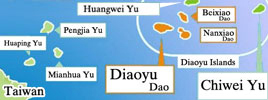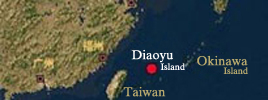A Chinese cook who crashed into the sea while trying to fly on a hot-air balloon to islands claimed by both China and Japan has been rescued by Japan's Coast Guard.

Diaoyu Islands, the eight uninhabited islands and rocks lie in the East China Sea. They have a total area of about 7 square km and lie east of the Chinese mainland and southwest of Japan's southern-most prefecture, Okinawa. They matter because they are close to strategically important shipping lanes, offer rich fishing grounds and are thought to contain oil deposits.
The islands have appeared on maps of China since the Ming Dynasty (1368-1644). Fishermen from Taiwan and Fujian and other provinces have fished and collected herbs in this area for many generations. Records about the islands were published in a book during the rule of Ming emperor Yong Le (1403-1424), more than 400 years before Japan says it discovered the Diaoyu islands in 1884.
In 1895, through a war of aggression against China, Japan forced the Qing Government to sign the unequal Treaty of Shimonoseki, and forcibly occupied the province of Taiwan. When Taiwan was returned in the Treaty of San Francisco, China says the islands - as part of it - should also have been returned.
Chinese government statement

The Chinese government solemnly states that the Japanese government's so-called "purchase" of the Diaoyu Island is totally illegal and invalid. It does not change, not even in the slightest way, the historical fact of Japan's occupation of Chinese territory, nor will it alter China's territorial sovereignty over the Diaoyu Island and its affiliated islands. Long gone are the days when the Chinese nation was subject to bullying and humiliation from others. The Chinese government will not sit idly by watching its territorial sovereignty being infringed upon. The Chinese side strongly urges the Japanese side to immediately stop all actions that may undermine China's territorial sovereignty. Japan should truly come back to the very understanding and common ground reached between the two sides, and should return to the track of negotiated settlement of the dispute. Should the Japanese side insist on going its own way, it shall have to bear all serious consequences arising therefrom.


